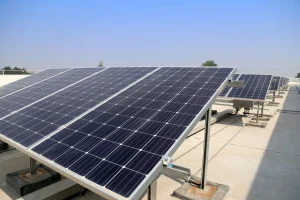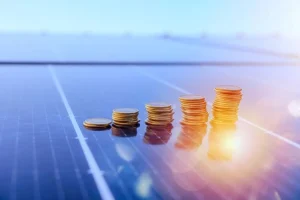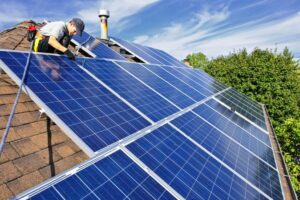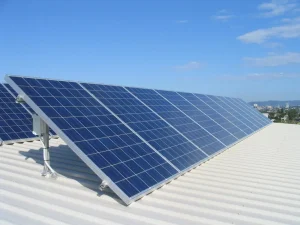How to Store Solar Energy: Batteries and Other Options

Storing solar energy is an important consideration for individuals and businesses looking to make the most of their solar power systems. In Singapore, there are several options for storing solar energy, including batteries and other technologies. Here are some of the most popular methods:
Batteries for Storing Solar Energy in Singapore

Batteries are a popular option for storing solar energy in Singapore. These batteries can be charged during the day when the sun is shining, and then used at night or during cloudy days when solar power production is lower. There are several types of batteries available, including lead-acid, lithium-ion, and flow batteries.
Lead-acid batteries are the most commonly used batteries for solar energy storage. They are relatively inexpensive and have been used for many years in other applications such as cars and boats. However, they require regular maintenance and have a limited lifespan. These batteries have a lower energy density compared to lithium-ion batteries, meaning they will require more physical space for the same energy storage capacity. They also require replacement after a few years of use.
Lithium-ion batteries are becoming increasingly popular for solar energy storage due to their high energy density, long lifespan, and low maintenance requirements. They are also more expensive than lead-acid batteries. However, they have a higher cycle life than lead-acid batteries, which means they can be charged and discharged more times. This makes them a more cost-effective option in the long run. Lithium-ion batteries have a smaller physical footprint compared to lead-acid batteries and can be easily integrated into homes or businesses.
Flow batteries are a newer technology that uses two tanks of liquid electrolytes to store energy. They have a longer lifespan than lead-acid batteries and can be charged and discharged simultaneously, making them ideal for applications where a constant power supply is required. These batteries are still relatively expensive, and their commercial viability is still being evaluated.
When considering battery options for solar energy storage, it is important to consider factors such as energy density, lifespan, maintenance requirements, and cost. The size and output capacity of the solar panel array must also be taken into account when sizing the battery system. Consulting with a solar panel installation company can help you find the most suitable battery system for your needs.
In conclusion, batteries are a popular and effective option for storing solar energy in Singapore. While lead-acid batteries are the most commonly used due to their low cost, lithium-ion and flow batteries offer higher energy density, longer lifespans, and lower maintenance requirements. When choosing a battery system, it is important to consider your energy requirements and budget to find the most suitable option for your needs.
Other Options for Storing Solar Energy in Singapore

In addition to batteries, there are other options for storing solar energy in Singapore. These include hydrogen fuel cells, thermal energy storage, and power-to-gas.
Hydrogen fuel cells convert hydrogen gas into electricity, making them a clean and efficient way to store and use solar energy. They are still relatively expensive and require a large amount of space, but their potential for large-scale energy storage makes them an attractive option for the future. Hydrogen fuel cells produce water vapor as their only byproduct, making them a clean energy source.
Thermal energy storage systems use heat to store solar energy. This can be done using a variety of methods, including molten salt, phase change materials, and thermal storage tanks. These systems are still relatively new and expensive, but they have the potential to store large amounts of energy for long periods of time. Thermal storage is suitable for large-scale commercial applications.
Power-to-gas is a process that converts excess electricity from solar panels into hydrogen or methane gas. This gas can then be stored and used as a fuel for heating, transportation, or electricity generation when solar power production is low. This technology is still in the early stages of development, but it has the potential to be an efficient and cost-effective way to store solar energy. This technology requires electrolysis of water, which can be energy-intensive and expensive.
When considering these alternative options for storing solar energy in Singapore, it is important to weigh the advantages and disadvantages of each. Hydrogen fuel cells offer clean and efficient energy storage, but their high cost and large footprint may limit their application. Thermal energy storage is suitable for large-scale commercial applications but may not be cost-effective for residential use. Power-to-gas is still in its early stages of development, but it has the potential to be a cost-effective solution for energy storage in the future.
It is important to note that these alternative options for storing solar energy are not mutually exclusive. Hybrid systems that combine different storage technologies can be used to optimize energy storage and reduce costs. For example, a system that uses batteries and thermal energy storage can provide a more comprehensive solution for energy storage that takes advantage of the strengths of each technology.
In conclusion, there are several alternative options for storing solar energy in Singapore beyond batteries. Hydrogen fuel cells, thermal energy storage, and power-to-gas all offer unique advantages and disadvantages. When considering these options, it is important to weigh factors such as cost, energy density, and maintenance requirements to find the most suitable solution for your energy storage needs. Hybrid systems that combine different storage technologies can also be used to optimize energy storage and reduce costs. With continued research and development, these alternative options for storing solar energy have the potential to transform the way we generate and use energy in Singapore.

Solar panels can provide significant benefits for businesses looking to save on electricity costs and reduce their carbon footprint. Here are some of the ways that solar panels can help businesses save electricity:
- Generating electricity: Solar panels convert sunlight into electricity, which can be used to power your business. By using solar energy instead of electricity from the grid, your business can significantly reduce its electricity bills. The more electricity your solar panels generate, the less you need to purchase from the grid, which can result in significant savings over time.
- Net metering: Net metering is a program that allows businesses to receive credit for any excess electricity generated by their solar panels. This means that during times when your solar panels produce more electricity than your business needs, the excess electricity can be fed back into the grid and you can receive credits that can be used to offset your electricity bills. In some cases, businesses can even receive a check from their utility company for the excess electricity they generate.
If you would like to install solar panel for your business you can contact us here.
